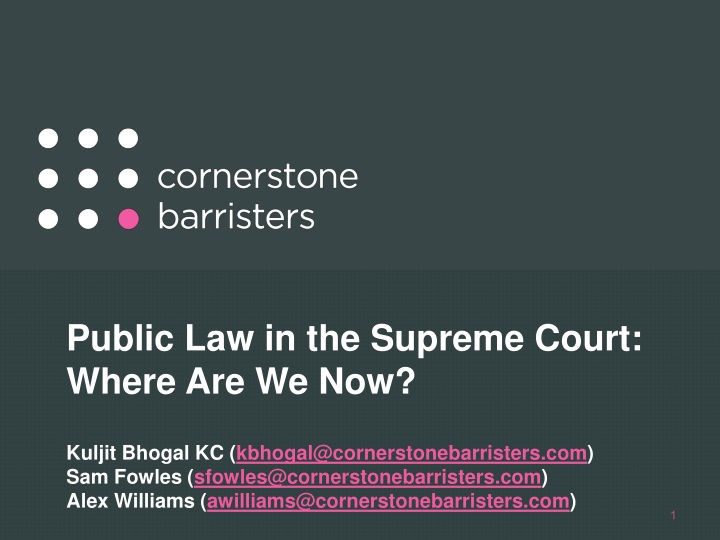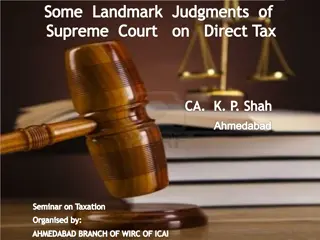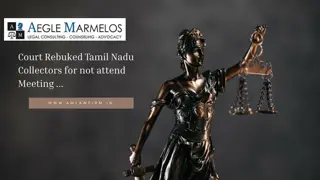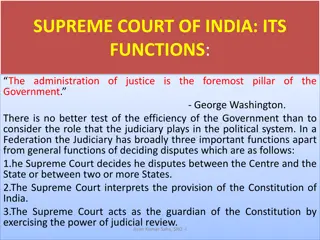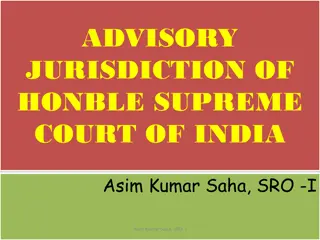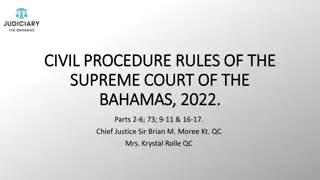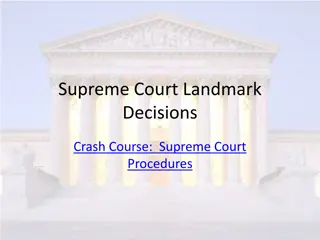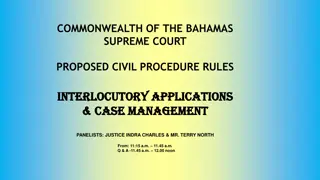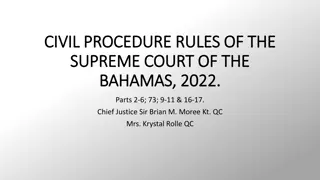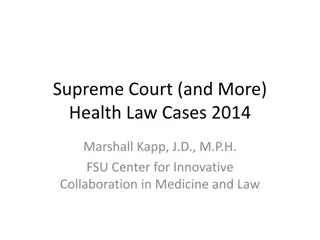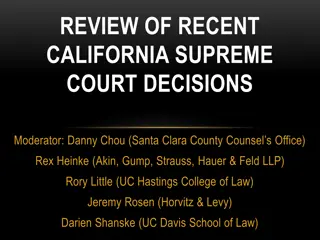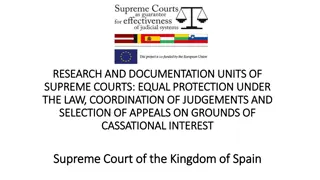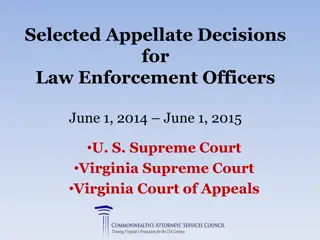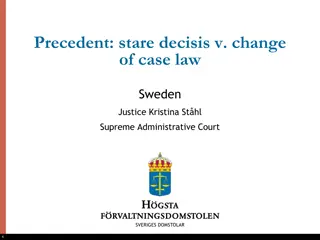Public Law in the Supreme Court: Where Are We Now?
Several senior Supreme Court judges have retired, leading to a shift in approaches within the court. The discussion revolves around the Diceyan framework, parliamentary sovereignty, rule of law, and the impact of the HRA 1998 on key cases.
Download Presentation

Please find below an Image/Link to download the presentation.
The content on the website is provided AS IS for your information and personal use only. It may not be sold, licensed, or shared on other websites without obtaining consent from the author.If you encounter any issues during the download, it is possible that the publisher has removed the file from their server.
You are allowed to download the files provided on this website for personal or commercial use, subject to the condition that they are used lawfully. All files are the property of their respective owners.
The content on the website is provided AS IS for your information and personal use only. It may not be sold, licensed, or shared on other websites without obtaining consent from the author.
E N D
Presentation Transcript
Public Law in the Supreme Court: Where Are We Now? Kuljit Bhogal KC (kbhogal@cornerstonebarristers.com) Sam Fowles (sfowles@cornerstonebarristers.com) Alex Williams (awilliams@cornerstonebarristers.com)
Overview Several senior supreme court judges have retired in recent years: Lady Hale, Lord Carnworth, Lord Wilson and Lord Kerr. Current president Lord Reed, replacing Lady Hale Will look at what this means
A change in approach? Diceyan realists (Hale and Bingham): hold the executive to account influence and relevance of international law Diceyan traditionalists (Reed): parliament is the ultimate arbiter, not the courts rejects relevance of international law courts to defer to parliament
Diceyan Framework (1) Parliamentary sovereignty as the constitutional bedrock Strict separation of powers Textual interpretation of statutes (as distinct from more modern purposive interpretations)
Diceyan Framework (2) Rule of law thin not thick Equality before the law Dislike of administrative discretion Strict dualism influence by international law only if sanctioned by Parliament
The HRA 1998 and the High Watermark: 3 Cases
(1) A v Home Secretary [2004] UKHL 56 UK Government derogates from Art 5 ECHR (right to liberty) following 9/11 attacks ATCSA 2001, s.23 detention of non- nationals suspected of terrorism who cannot be deported Whether Art 15 ECHR (derogation) satisfied
(1) A v Home Secretary [2004] UKHL 56 SIAC says a public emergency existed, but measures were disproportionate; quashes 2001 derogation order and grants a DOI against s.23 Court of Appeal allows SOS s appeal HL overturns CA; restores SIAC
(1) A v Home Secretary [2004] UKHL 56 Lord Bingham: Great weight to Govt and Parliament on the question of public emergency ( 29) Re strict necessity, the degree of deference conditioned by the nature of the decision ( 39) Deference does not preclude a review of proportionality here ( 42), esp. given liberty ( 44)
(1) A v Home Secretary [2004] UKHL 56 Baroness Hale: Agrees with Lord Bingham et al ( 219) Only courts can decide when/for how long to detain ( 222) Democracy/majoritarian rule cannot prevail if inconsistent with equal rights ( 237)
(1) A v Home Secretary [2004] UKHL 56 Headline points: Robust protection of individual liberty, even in the face of clear legislation Robust analysis of proportionality of Govt measures, despite national security context Robust application of international law, not simply the ECHR but other international treaties
(2) Ex p Ullah [2004] UKHL 26 Asylum applications of non-nationals rejected Whether deportation to countries with risk of religious persecution breaches Art 9 What it means to take into account Strasbourg cases
(2) Ex p Ullah [2004] UKHL 26 Lord Bingham ( 20); Baroness Hale concurs Only the Strasbourg Court can correctly interpret the ECHR as an international instrument National courts shouldn t therefore dilute/weaken the effect of Strasbourg case-law Duty of national courts is to keep pace with Strasbourg: no more, but certainly no less
(2) Ex p Ullah [2004] UKHL 26 Headline points: Strong appreciation of the importance of ECHR and authority of Strasbourg Court Subsidiary role for domestic courts on ECHR matters ( meaning should be uniform in Europe) Reading-up of s.2 discretion ( take into account ) into something closely resembling a duty to follow
(3) YL v Birmingham CC [2007] UKHL 27 Provision/termination of residential care services by private provider on BCC s behalf Whether a function of a public nature under s.6(3)(b) HRA so as to engage ECHR duties By bare majority HL says not
(3) YL v Birmingham CC [2007] UKHL 27 Lord Bingham (dissenting): The answer is clear ( 2). No test , but s.6 deserves a wide reading as a measure intended to give effect to ECHR ( 4). Parliament would not have intended to leave residents of care homes unprotected ( 19).
(3) YL v Birmingham CC [2007] UKHL 27 Baroness Hale (dissenting): White Paper Govt wanted domestic remedies if UK responsible in Strasbourg ( 55). Various relevant factors ( 66-72) including whether state has assumed responsibility, and public funding Close connection between this service and the ECHR s core values, plus risk of violation ( 71)
(3) YL v Birmingham CC [2007] UKHL 27 Majority position: Private arrangement for the payment of a commercial fee ( 27, Lord Scott). No contracting-out ( 147, Lord Neuberger) Arbitrary to give enhanced protection to contracted-out residents; for Parliament to widen ECHR protection to private providers ( 151 and 171, Lord Neuberger)
(3) YL v Birmingham CC [2007] UKHL 27 Headline points: Majority driven by technical legal position (contract) and commercial setting; keen not to disadvantage privately-funded users or trespass into political decision-making Bingham/Hale approach driven by the position of the individual, and need for protection; relies more heavily on ECHR values/duties
The Reed Court and the Return of Traditionalism
The Reed Court Refused 80% of human rights claims (Hale court 60%) Public bodies twice as likely to win than lose (Hale court closer to even chance)
3 Key Changes Increased deference to the executive/public bodies. Courts no longer seen as the ultimate arbiter of rights. International standards (including human rights) less relevant.
3 Case Studies R (Begum) v Special Immigration Appeals Commision [2021] AC 765 ( Begum ) R (Friends of the Earth) v Secretary of State for Transport [2021] PTSR 190 ( FoTE ) R (SC) v Secretary of State for Work and Pensions[2022] AC 223 ( SC )
Begum Shamima Begum radicalised/groomed as a child and ran away/trafficked to join ISIS British nationality terminated s. 40 British Nationality Act 1981 Refused leave to enter the UK to contest the decision. Challenge failed before SIAC but succeeded in the Court of Appeal.
FoTE Third runway at Heathrow Challenge to the Airports National Policy Statement Section 5 of the Planning Act 2008 SOS required to explain how she had taken government policy into account. Challenge failed to take emissions commitments under Paris Climate Agreement 2015 into account. Succeeded in Court of Appeal
SC Two child limit for tax credits Discriminated against women Engaged Art. 14 ECHR Was the discrimination permissible? What standard should be applied? Claimants had lost case at every level.
Deference to the Executive Begum - Case concerned national security so court must defer to executive throughout (not just on national security assessment). FoTE Narrowed definition of government policy essentially legitimate expectations . SC Manifestly without reasonable foundation test.
Deference to the Executive Lord Reed in SC In practice, challenges to legislation on the ground of discrimination have become increasingly common in the United Kingdom. They are usually brought by campaigning organisations which lobbied unsuccessfully against the measure when it was being considered in Parliament, and then act as solicitors for persons affected by the legislation, or otherwise support legal challenges brought in their names, as a means of continuing their campaign. The favoured ground of challenge is usually article 14, because it is so easy to establish differential treatment of some category of persons, especially if the concept of indirect discrimination is given a wide scope.
Parliament as Guardian of Constitution/Rights Lord Hope Jackson v Attorney General [2005] UKHL 56 It must never be forgotten that this rule [of recognition]... depends maintaining the trust of the electorate. In a democracy the need of the elected members to maintain this trust is a vitally important safeguard. The principle of parliamentary sovereignty... is built upon the assumption that Parliament represents the people whom it exists to serve. upon the legislature
Parliament as Guardian of Constitution/Rights Lady Hale Ghaidan v Godin Mendoza [2004] 2 AC 577 Such a guarantee of equal treatment is also essential to democracy. Democracy is founded on the principle that each individual has equal value. Treating some as automatically having less value than others not only causes pain and distress to that person but also violates his or her dignity as a human being. The essence of the Convention, as has often been said, is respect for human dignity and human freedom: see Pretty v United Kingdom (2002) 35 EHRR 1 , 37, para 65. Second, such treatment is damaging to society as a whole. Wrongly to assume that some people have talent and others do not is a huge waste of human resources. It also damages social cohesion, creating not only an under-class, but an under-class with a rational grievance. Third, it is the reverse of the rational behaviour we now expect of government and the state. Power must not be exercised arbitrarily. If distinctions are to be drawn, particularly upon a group basis, it is an important discipline to look for a rational basis for those distinctions. Finally, it is a purpose of all human rights instruments to secure the protection of the essential rights of members of minority groups, even when they are unpopular with the majority. Democracy values everyone equally even if the majority does not.
Parliament as Guardian of Constitution/Rights Begum - Accepted concerned fundamental rights but applied reasonableness not proportionality standard (contrary to Pham v Home Secretary [2015] 1 WLR 1591 and UNISON v Lord Chancellor [2017] UKSC 51] FoTE Adopting executive perspective. SC Fundamental rights and the separation of powers itself is in the gift of Parliament.
Parliament as the Guardian of Constitution/Rights Lord Reed in SC Since the principle of proportionality confers on the courts a very broad discretionary power, such cases present a risk of undue interference by the courts in the sphere of political choices. That risk can only be avoided if the courts apply the principle in a manner which respects the boundaries between legality and the political process. As Judges Pejchal and Wojtyczek commented, at para 10: Judicial independence is accepted only if the judiciary refrains from interfering with political processes. If the judicial power is to be independent, the judicial and political spheres have to remain separated.
Reduced relevance of international standards Begum Customary international law standards not taken into account. FoTE The executive s agreement to be bound by international law is not government policy SC Compliance with UN Convention on the Rights of the Child not even relevant to the interpretation of domestic/human rights law.
Significance Greater deference to discretion Less tolerance for public interest claims Fundamental rights not seen as trumps Housing/benefits cases UNCRC etc not relevant to interpretation Planning cases Climate change commitments unlikely to be relevant (for now!)
What does this mean for public law decision making?
Public interest groups Background documents Relevance of international law Standard of review in areas of social and economic policy: manifestly without reasonable foundation Does MWRF insulate the decision maker from effective review?
